Turan
I don’t know Adam Turan. He’s probably a nice guy. He probably does very ordinary things like the rest of us. What troubles me is the message he peddles.
Try this one, for example. It’s fairly characteristic of his consistent support for an independent state in Xinjiang.
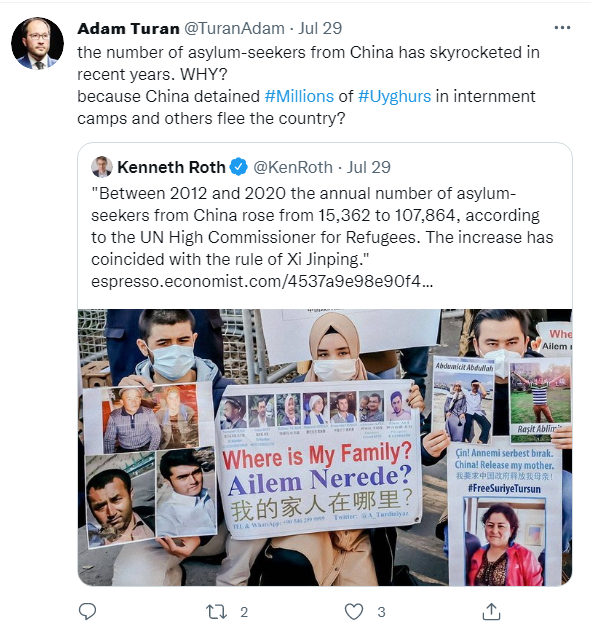
Now, note the question marks. These are not questions for which he is polling Twitter for responses. They are rhetorical. The answer is both in the question and in the retweet.
Turan is is employing a propaganda technique called plausible deniability. He can say, “Well, I was just quoting Roth, that well known boss of HRW. How was I to know that the statistics were dodgy?”
Plausible deniability requires that the information be plausible. Of course, the numbers quoted in Roth’s tweet are accurate. So, there’s the plausibility. Except that, without context, these numbers are completely deceitful.
Is this Turan’s intention or is he just happy to retweet misinformation without fact checking? I don’t know. It could be just confirmation bias. The numbers ‘sound’ like they support his ETIM inspired narrative.
I suspect Turan doesn’t care whether the numbers are in context, so long as they have propaganda value. I suspect that he knows that most readers will simply not dig deep to find the truth. They will take the numbers on face value and make the completely absurd, conspiratorial link to Xi Jinping.
Roth
Like Turan, Roth deploys the plausible deniability technique as well. After all, it wasn’t him, but a ‘reputable’ journal that makes this claim. Roth seems to think that presenting facts so they are deceitful is fine. Does make you wonder whether this is also applied to the reports from the organisation he heads. Balance, fairness, integrity of sources? Who gives a shit?
The quote comes from this source:
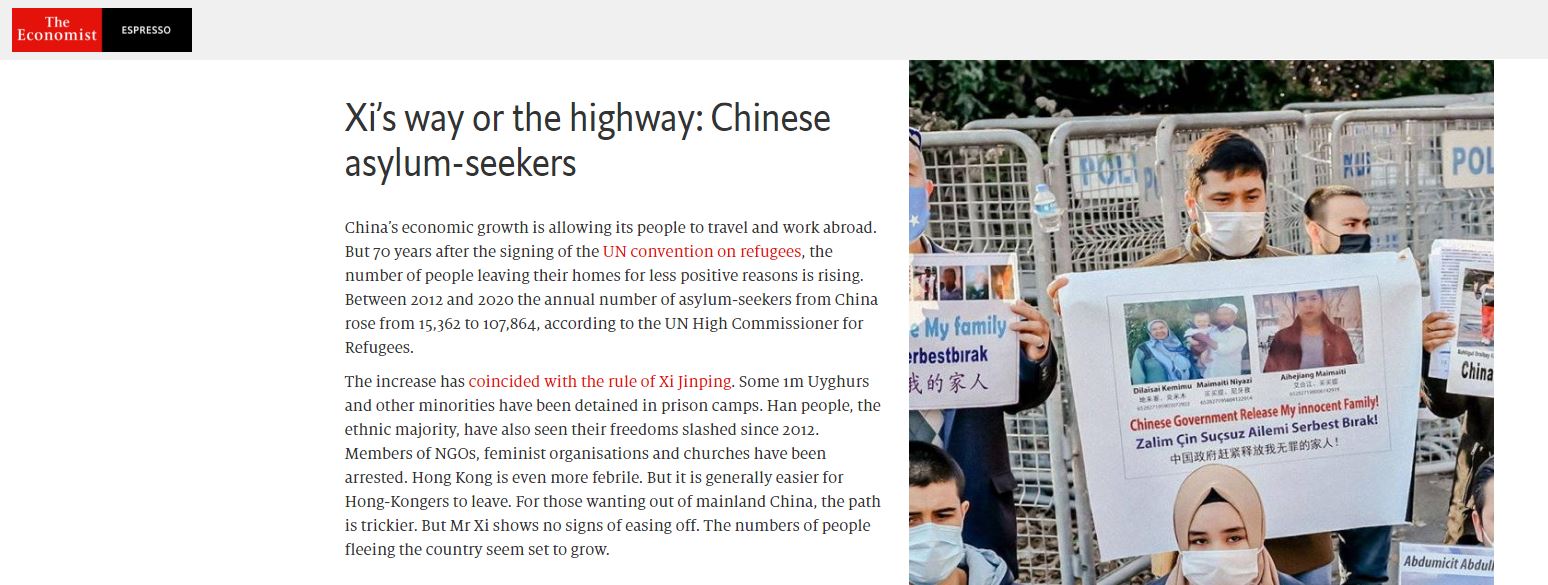
Between 2012 and 2020 the annual number of asylum-seekers from China rose from 15,362 to 107,864, according to the UN High Commissioner for Refugees. This increase has coincided with the rule of Xi Jinping. (The Economist)
Roth has deniability by retweeting the Economist, and plausibility because he knows the numbers are right – or at least, a quick check of the UNHCR proves it correct. But one element of the story is complete conjecture and Roth almost certainly knows that – the connection with Xi.
Sure, the word used is “coincided”. There you go. Deniability again. “I didn’t say Xi caused it.” But, as every media expert will tell you, simply juxtaposing two unrelated items creates a connection in over-active, pattern seeking human brains.
As Sapolsky so aptly illustrates in Behave: The Best and Worst of Us, “Was that a gun or a phone in that man’s hand when I shot him dead? In the moment, I simply reacted.” Here’s the thing. The associations the brain makes happen in the first second. It takes no time at all for any human brain to create a straight line between asylum seeking skyrocketing and Xi, regardless of the clever use of “coinciding”. After that, it’s a lot of effort for the frontal cortex to undo that connection. We are, literally, wired for associations, many completely unjustified and irrational.
Given Roth’s oversight of reports that roundly condemn China, this straight line suits him just fine. Why question this when you have plausible deniability?
Note how closely to follows this article:
According to UN High Commissioner for Refugees (UNHCR) figures, the annual number of asylum seekers from China increased from 15,362 to 107,864 between 2012 and 2020. 613,000 Chinese people have applied for asylum in another country since Xi Jinping gained power at the end of 2012.
You see. It wasn’t me who said it. It was Wion. No need to check it out, to see if it is in any way deceitful.
What actually is the situation? Here’s the UNHCR’s take.
68% originate from just five countries.
More than two thirds of all refugees under UNHCR’s mandate and Venezuelans displaced abroad come from just five countries (as of end-2020).
Syrian Arab Republic 6.7 million
Venezuela 4.0 million
Afghanistan 2.6 million
South Sudan 2.2 million
Myanmar 1.1 million
I guess, like me, you’re wondering why there’s no mention of China. Oops, how embarrassing for the Economist, who didn’t check sources. How awkward for Roth, who didn’t bother to put up the figures in context. How painful for Turan, when his narrative is blown out of the water.
The smear against Xi is the real point for Turan, Roth, The Economist and Wion. How does their little accusation stack up? Sadly, it’s bullshit.
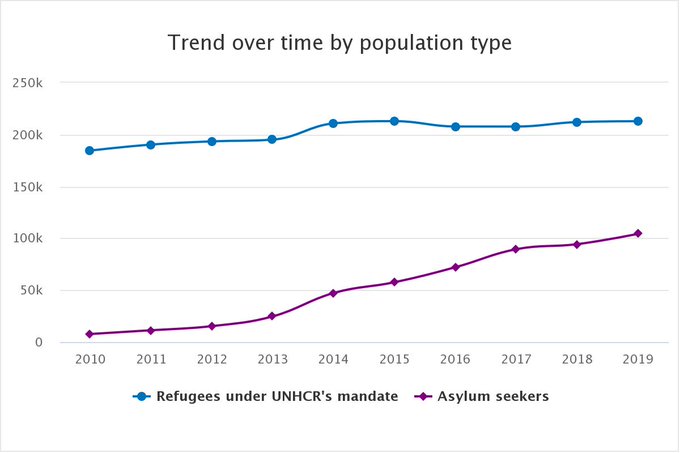
Sorry, but this graph, straight out of the UNHCR database, while affirming the asylum numbers given for plausible deniability, actually shows China, in 2013, at Xi’s ascendency, from a base of about 2.5% of the world’s asylum seekers (about 25000 of 1000000), stay on trend with 2.5% in 2020 (100000 of 4000000). More telling, refugee numbers have pretty much stayed constant since Xi took power.
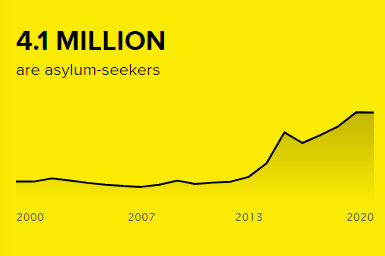
Indeed, the rise is asylum-seekers globally is dramatic. And troubling. And a cause for concern. Nobody is going to deny that. But when you find this same trend across country after country, an intelligent person says, “This is a trend beyond China. It has nothing to do with Xi.”
To illustrate this, take the data for Germany. Look at that. Almost identical trend. So, tell me, can we attribute this to Xi?
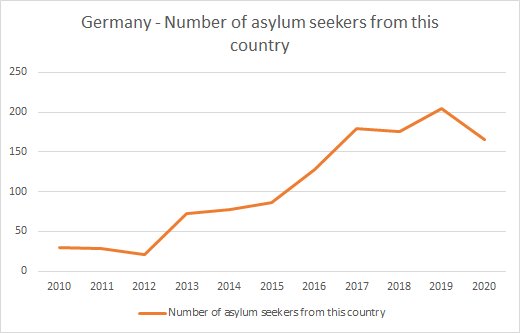
But, if you really want to be fair, 0.007% of China’s population (yes, across the whole country) applied for asylum elsewhere. No, the idea that there is a great rush of discontented people out of China is just bullshit. At most, it’s a trickle. Maybe not a figure China wants to boast about, but also not a figure that makes China really stand out. The data says so. The UNHCR has identified the top spots for discontent. You don’t get to simply pluck those figures out of their website and then make up a narrative to suit.
And data without a context is just lies – a deliberate choice to deceive. It doesn’t reflect on the data – it reflects on the author and the ‘retweeter’. It’s their integrity which we need to doubt.
So, if you want to draw a line between Xi and asylum seekers, take one of these two roads – make it fair, in which case you find Xi has no case to answer, especially in Xinjiang (for which there are no statistics) and that the numbers, while not wonderful, are, in context, entirely unremarkable.
Or, take the road of plausible deniability and construct a deceitful picture in which a coincidence becomes a cause, and an opportunity to smear.
I think you can see which road Turan, Roth, The Economist and Wion took.